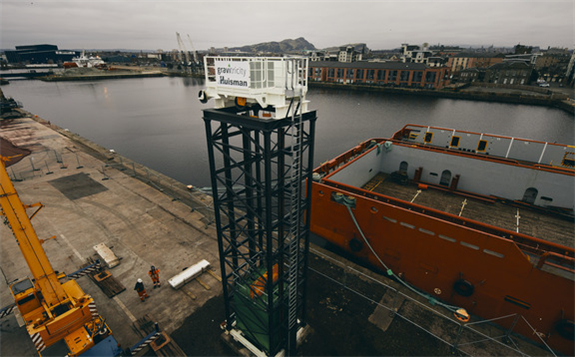New 250kW project aims to demonstrate viability and cost-competitiveness of gravity-based energy storage system

A cutting edge demonstration project that developers claim could offer a cost effective, long life alternative to lithium-ion battery based energy storage systems has come online in Scotland, providing a major boost to hopes that gravity-based energy storage systems could be deployed at scale.
Clean tech start up Gravitricity announced last week that it has successfully commissioned a 250kW energy storage demonstrator that "proves the capability" of the company's gravity-powered technology.
In a series of tests carried out on the demonstrator the company successfully raised and lowered two 25-tonne weights to generate full power and verify the system's speed of response.
Built above ground, the grid connected demonstration project in the Port of Leith aims to showcase how full scale installations sunk into either disused mineshafts or purpose-built shafts could provide grid-scale energy storage capacity.
The company said its full-scale 8MW batteries - which work by raising one or more heavy weights in a deep shaft and releasing them when energy is required - could store enough electricity to power 5,000 homes for an hour.
Developed with support from Innovate UK, the £1, 12-metre-high test rig is intended as a precursor to a series of 4-8MW projects in disused mine shafts around the world.
"These tests confirm our modelling and show that gravity energy storage is a serious contender in the global energy storage market," said Gravitricity managing director Charlie Blair. "We've proven we can go from zero to full power in less than a second - which can be extremely valuable in the frequency response and back-up power markets - plus our ability to continuously vary power output dependent on demand."
He added that the company would now run tests with the two single weights, dropping one after the other to verify smooth energy output over a longer period.
Advocates of gravity-based energy storage systems have long argued that they enjoy several potential advantages over the lithium-ion battery based systems that currently dominate the fast-expanding grid-scale energy storage market.
"A key feature of our full-scale projects will be their long life," Blair explained. "Once built, our system can last for over 25 years, with no loss in output or degradation over time. This makes gravity storage cost-effective. And unlike batteries, we have no reliance on rare metals such as cobalt and nickel which are becoming increasingly scarce in the global drive to electrification."
Advocates of battery-based systems maintain that concerns over their degradation over time have been overblown and that alternative approaches will struggle to match the rapid cost reductions seen in the battery market.
However, the nascent gravity-based sector is optimistic it can prove cost competitive, especially if it is able to partner with owners of existing disused mine shafts. A 2019 study by analysts at Imperial College calculated that a Gravitricity system could store electricity at half the lifetime cost of lithium-ion batteries.
Gravitricity said it was already in "advanced discussion" with mine owners in the UK, Scandinavia, Poland, and the Czech Republic to select its first European projects, while in South Africa the firm is working closely with mine operator United Mining Services to identify potential schemes as part of a programme funded by Innovate UK's Energy Catalyst programme.
"In the UK we are considering brownfield sites and are also looking at the potential to sink a new-purpose built shaft in partnership with a major British civil engineering firm," Blair said.